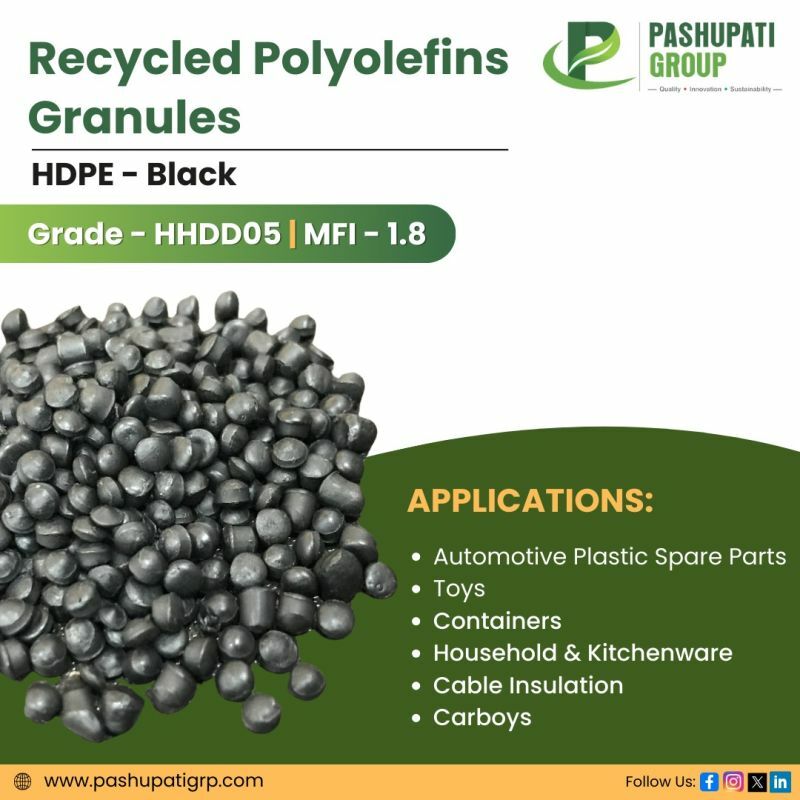Recycled polypropylene (PP) granules are becoming increasingly popular in various industries due to their eco-friendly nature and cost-effectiveness. Whether you're in the manufacturing, packaging, or construction sector, using recycled PP granules can offer significant benefits. However, before making a purchase, it's essential to be well-informed about several key factors. Here’s what you need to know before buying recycled PP granules.

1. Understand the Quality Standards
Grades of Recycled PP Granules
Homopolymer vs. Copolymer: Recycled PP granules come in two main types—homopolymer and copolymer. Homopolymer is known for its strength and stiffness, making it ideal for rigid products. Copolymer, on the other hand, offers more flexibility and impact resistance, which is better suited for products requiring durability under stress.
MFI (Melt Flow Index): The Melt Flow Index is a critical quality parameter. It indicates the flow rate of the melted polymer and is crucial in determining the processing conditions. A higher MFI means easier flow, which is suitable for thin-walled products, while a lower MFI is ideal for thicker, more durable items.
Purity and Consistency
Contamination Levels: Ensure that the recycled PP granules you purchase are free from contaminants like dirt, moisture, or other polymers, as these can affect the final product's quality.
Color Consistency: If color is important to your product, verify that the recycled PP granules offer consistent color throughout the batch. Inconsistent coloring can lead to defects or the need for additional processing.
2. Evaluate the Supplier’s Reputation
Experience and Expertise
Industry Experience: Choose a supplier with a proven track record in producing high-quality recycled PP granules. Suppliers with extensive industry experience are more likely to deliver reliable and consistent products.
Certifications: Check if the supplier has relevant certifications, such as ISO or other quality management systems. This indicates their commitment to maintaining high standards in production.
Customer Reviews and References
Customer Feedback: Look for reviews or testimonials from other buyers. Positive feedback can give you confidence in the supplier's ability to meet your expectations.
References: Don’t hesitate to ask the supplier for references. Speaking directly with other customers can provide valuable insights into the supplier’s reliability and product quality.
3. Consider the Environmental Impact
Source of Recycled Material
Post-Consumer vs. Post-Industrial: Recycled PP granules can be made from post-consumer waste (e.g., discarded packaging) or post-industrial waste (e.g., manufacturing scrap). Post-consumer recycled PP is often preferred for its higher contribution to waste reduction, but post-industrial recycled PP may offer better quality due to less degradation.
Sustainability Practices: Inquire about the supplier’s sustainability practices, such as energy-efficient production processes or waste management strategies. Choosing a supplier committed to environmental responsibility enhances your product's eco-friendliness.
Life Cycle Analysis
Carbon Footprint: Assess the overall environmental impact of the recycled PP granules by considering their carbon footprint. This includes the energy used in recycling and the emissions generated during production.
End-of-Life Considerations: Consider how the recycled PP granules will be managed at the end of your product's life cycle. Opt for materials that can be recycled again to support a circular economy.
4. Determine the Application Suitability
Compatibility with Your Production Process
Processing Requirements: Ensure that the recycled PP granules are compatible with your existing equipment and processing methods. This includes checking the granules' MFI, moisture content, and other physical properties.
Performance Criteria: Consider the specific performance requirements of your product, such as strength, flexibility, and heat resistance. Choose recycled PP granules that meet these criteria to ensure optimal product performance.
Testing and Prototyping
Sample Testing: Request samples from the supplier and conduct thorough testing in your production environment. This helps in identifying any potential issues before committing to a larger order.
Prototyping: If possible, create prototypes using the recycled PP granules to evaluate their performance in real-world applications. This step is crucial for ensuring that the final product meets your quality standards.
5. Analyze the Cost-Benefit Ratio
Price vs. Quality
Cost Considerations: While recycled PP granules are generally more cost-effective than virgin PP, it's essential to balance cost with quality. Cheaper granules may have higher contamination levels or inconsistent properties, leading to additional costs in processing or product defects.
Long-Term Savings: Consider the long-term savings associated with using high-quality recycled PP granules, such as reduced material waste, lower processing costs, and improved product durability.
Return on Investment
Product Lifecycle: Evaluate how the use of recycled PP granules affects the overall lifecycle of your product. High-quality granules can extend product life, enhance performance, and reduce warranty claims, leading to a better return on investment.
Market Perception: Using recycled materials can enhance your brand's image as an environmentally conscious company. This can lead to increased customer loyalty and potentially higher sales, offsetting the initial cost of the granules.
Conclusion
Purchasing recycled PP granules offers significant environmental and economic benefits, but it's essential to make informed decisions. By understanding the quality standards, evaluating suppliers, considering environmental impact, assessing application suitability, and analyzing the cost-benefit ratio, you can ensure that the recycled PP granules you choose will meet your needs and contribute to the success of your products.
4o
Where to buy PP granules
